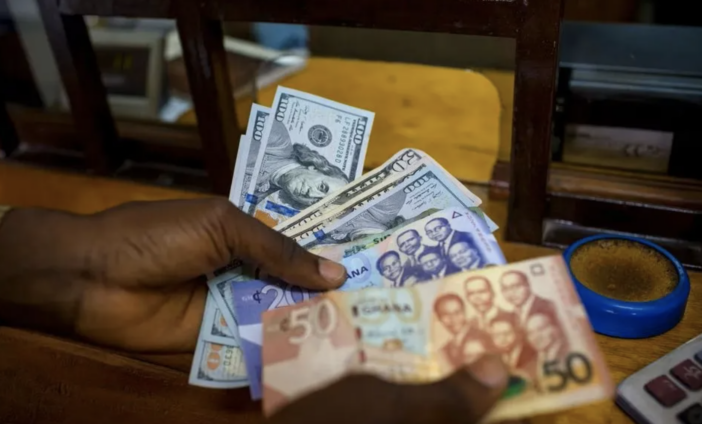Banking consultant Dr Richmond Atuahene says undisciplined and persistent fiscal deficits and loose monetary policies have been important drivers of exchange rate instability in Ghana.
He says notable in this regard is the period from 2020 to 2023, when government spending and money creation increased rapidly, triggering inflation and currency depreciation.
Dr. Atuahene who was speaking at the Ghana National Chamber of Commerce and Industry (GNCCI) Dialogue Series, said whenever Ghana’s fiscal and monetary policies were relatively loose, the exchange rate tended to experience large depreciations.
The Dialogue was on the theme: “Navigating the rapid depreciation of the Ghana Cedi: Surviving in the Midst of the Crisis.”
He said depreciation had happened because of supply and
demand fluctuations, the lack of access to international capital markets, shortage of foreign direct investment, poor cocoa harvests, government/ Bank of Ghana averting leakage of foreign remittances.
He said the depreciation of the cedi, in turn, was contributing to high inflation rates in the local market.
He said inflation for locally produced items was 16.1 per cent, while inflation for imported items was 25.0 per cent in April 2024, inflation was sharply eroding the purchasing power of consumers as prices of most consumables go up almost every other week.
The Banking Consultant said a secondary effect was reduced demand for some products that average consumers now considered to be luxuries and no longer affordable not necessarily because the prices of such products had gone up, but because the prices of competing basic needs had increased dramatically.
The situation is affecting all sectors of the economy; however, some key sectors that are particularly affected by depreciation affecting consumer demand include consumer and household goods, agricultural Inputs like fertilizers and pesticides, oil, and gas (gas and diesel) and agribusiness and processed foods.
The rest are pharmaceuticals and Drugs, raw materials, semi-process products, poultry products and Meat Products, tomatoes, onions, and carrots.
He said the government must re-negotiate existing leasing contracts with Mining Companies Operating in the Country Based on Botswana’s Model with Anglo/American De Beers could be classified as part of a medium-term strategy to address the persistent depreciation of Cedi.
“The average return on the total Gold exported is between 13.1 per cent to 14.1 per cent,” he said.
The exported total value of US$ 43 billion for the period 2014 to 2022 and surrendered value to the Bank of Ghana’s Account was US$6.4 billion just about 14.8 per cent.
In 2022, Ghana extracted and exported a total value of US$ 6.6 billion with a surrendered portion of US$ 865 million just about 13.1 per cent.
The returns from existing mining contracts are relatively low compared to Botswana’s Diamond to Anglo American De Beers of 30 per cent of the Diamond exports.
He said as part of the long-term strategy Ghana must improve on the current commodity dependence and increase export diversification in the non-Cocoa Sector like Industrial salt, Rice, Maize, Cashew, Soya beans, shea butter and poultry products to improve trade and current account surpluses to ensure the exchange rate stability in Ghana.
He said the government must build sustainable external confidence in the economy, by implementing disciplined fiscal and monetary policies to ensure exchange rate stability.
“The government must work hard to create a stable and enabling macroeconomic environment of lower inflation, lower policy rate, lower bank lending rate and improved on the persistent fiscal deficits financed by central bank,” he added.
Dr. Clement Osei Amoako, President of GNCCI, said the Series was a vital initiative because it served as an advocacy platform where we engage on issues of national relevance, aiming to make policy recommendations to the government to create a conducive business environment.
He said through the dialogue, they also advised business operators on critical business-related issues.
He said the session was, especially significant given the continuous rapid depreciation of the local currency, which seriously threatened business growth and inflation, adding that after stabilizing for just about a year, it was alarming to observe the re-emergence of rapid depreciation.
Dr Osei-Amoako said the rapid depreciation coincided with an economy that had consistently slowed, with growth averaging 3 per cent over the past five quarters, despite participation in the IMF bailout programme.
He said the environment for business growth had become increasingly difficult, characterized by high operating costs due to excessive taxes, irregular power supply, and high lending rates.
“The currency’s rapid depreciation compounds the difficulties facing Ghanaian businesses, thus necessitating strategic approaches to mitigate risks to their operations,” he added.
Latest Stories
-
Gold Fields Ghana Foundation challenges graduates to maximize benefits of community apprenticeship programme
10 mins -
GBC accuses Deputy Information Minister Sylvester Tetteh of demolishing its bungalow illegally
21 mins -
Boost for education as government commissions 80 projects
32 mins -
NAPO commissions library to honour Atta-Mills’ memory
43 mins -
OmniBSIC Bank champions health and wellness with thriving community walk
45 mins -
Kora Wearables unveils Neo: The Ultimate Smartwatch for Ghana’s tech-savvy and health-conscious users
49 mins -
NDC supports Dampare’s ‘no guns at polling stations’ directive
52 mins -
Police officer interdicted after video of assault goes viral
1 hour -
KNUST’s Prof. Reginald Annan named first African recipient of World Cancer Research Fund
1 hour -
George Twum-Barimah-Adu pledges inclusive cabinet with Minority and Majority leaders
2 hours -
Labourer jailed 5 years for inflicting cutlass wounds on businessman
2 hours -
Parliament urged to fast-track passage of Road Traffic Amendment Bill
2 hours -
Mr Daniel Kofi Asante aka Electrician
2 hours -
Minerals Commission, Solidaridad unveils forum to tackle child labour in mining sector
2 hours -
Election 2024: Engagement with security services productive – NDC
2 hours

